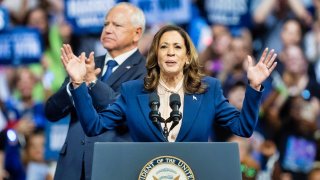Kamala Harris 2.0 Is A Clear Threat to Donald Trump
The problem is that Kamala Harris’ prudent refusal to offer many specific policy proposals and her sheer vivacity are rendering it difficult, if not impossible, for Donald Trump to demonize her.
The contrast between Donald Trump and Kamala Harris could hardly have been starker than on Thursday evening at the Democratic National Convention in Chicago. Unlike Trump, who hewed to his script at the Republican convention in Milwaukee for about twenty minutes before rambling on for another 72 minutes, Harris delivered a tightly crafted and crisp speech that made the case for her presidency. Along the way, she also disemboweled Trump, who was reduced to sending out petulant tweets as she spoke and calling in to Fox News afterward. He repeatedly pressed the buttons on the keypad of his phone, underscoring the impression of a delusional former president who is way out of his league—“an unserious man,” as Harris put it in her address.
It’s not surprising that Trump is mourning the absence of President Joe Biden. He offered an easy target. Harris does not.” WHERE’S Hunter?” Trump asked on Truth Social when Harris came on stage. The only appropriate response can be: who cares?
Trump is groping, and Harris is more than coping with the demands of the presidential race. The first part of her speech was devoted to explaining her early life in America, and the second to why Trump represents a peril to democracy and the rule of law. She presented herself as a political moderate, declaring, “I know there are people of various political views watching tonight. And I want you to know: I promise to be a president for all Americans.” It was a necessary vow, but one that also echoed Biden’s original campaign promise to unite the country—a goal that eluded him as the political divisions in America became even starker.
Still, it was striking that the convention embraced patriotic themes that the GOP has made hay within the past several decades. There were the red and white balloons. There were the American flags. There were the chants of “U-S-A!” And there were testimonials. Former Republican congressman Adam Kinzinger stated, “I want to let my fellow Republicans in on a secret: the Democrats are as patriotic as us. They love this country as much as we do.”
At the heart of Harris’ speech was less a program for what she represents than what she doesn’t. “Just imagine Donald Trump with no guardrails and how he would use the immense powers of the presidency of the United States,” she said. “Not to improve your life. Not to strengthen our national security but serve the only client he has ever had: himself.”
For all the enthusiasm surrounding the Democrats’ new and improved candidate, the battle has only now been truly joined. Unlike Hillary Clinton, who presumed that she would win in 2016, Harris will campaign down to the wire in the swing states. Trump remains a formidable but fading opponent. He claims that he will “expose all of her Radicalism, the horrible job she did at the Border, Crime and Foreign Relations, and her Weaponization against her Political Opponents.”
The problem is that Harris’ prudent refusal to offer many specific policy proposals and her sheer vivacity are rendering it difficult, if not impossible, for Trump to demonize her. In many ways, Trump is becoming a pantomime of himself. His familiar barrage of insults—“dumb as a rock,” “stone cold loser,” and so on—have long since passed their sell-by date. Unless he can devise a new formula, the only loser in November, as Harris’ bombshell speech suggested last evening, will be Trump himself.
About the Author: Editor of the National Interest, Jacob Heilbrunn
Jacob Heilbrunn is editor of The National Interest and is a nonresident senior fellow at the Atlantic Council’s Eurasia Center. He has written on both foreign and domestic issues for numerous publications, including The New York Times, The Washington Post, The Wall Street Journal, Financial Times, Foreign Affairs, Reuters, Washington Monthly, and The Weekly Standard. He has also written for German publications such as Cicero, Frankfurter Allgemeine Zeitung, and Der Tagesspiegel. In 2008, his book They Knew They Were Right: the Rise of the Neocons was published by Doubleday. It was named one of the one hundred notable books of the year by The New York Times. He is the author of America Last: The Right’s Century-Long Romance with Foreign Dictators.
Image Credit: Shutterstock.


